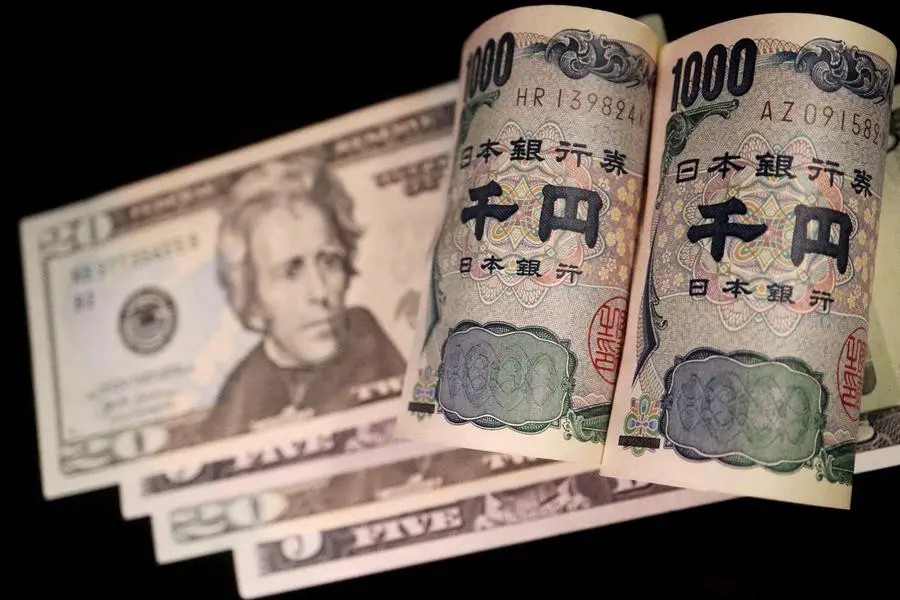PHOTO
TOKYO - Corporate Japan is starting to wonder if the weak yen has become too much of a good thing.
The currency fell to a 34-year low on Monday and has lost about a quarter of its value against the surging U.S. dollar in a little more than two years.
Typically, a weak yen is seen as a boon for Japan Inc, as it makes cars and other goods cheaper overseas and lifts profits when earnings from abroad are brought home.
But it has also pushed up costs of raw materials, food and fuel, battering sectors from farmers who import fertilisers to small manufacturers which rely on parts from China.
The biggest squeeze has been for households, which for years have seen little wage growth. Their plight -- and that of Japan's legions of struggling small businesses -- may say more about the state of the country's still-limping economy than the windfall for exporters such as Toyota Motor or the stock market's climb to a record high.
Smaller firms employ seven out of 10 workers in Japan, and have less ability to pass on rising costs by raising their selling prices in a competitive market.
"The yen is a little too weak," the chairman of the powerful Keidanren business lobby, Masakazu Tokura, told a regular press conference last week, days before Monday's sell-off briefly pushed the currency past 160 to the dollar.
Current currency levels beyond 150 to the dollar did not represent the "true strength of Japan's economy" he said.
Japanese authorities likely intervened in the market to put a floor under the yen on Monday, traders said, a supposition borne out by Bank of Japan data a day later, but it is expected to remain weak as long as the U.S. Federal Reserve keeps interest rates high.
The yen was around 157.91 to the dollar on Wednesday.
A more "comfortable" level would be 125 to the dollar, Koji Shibata, the head of ANA Holdings, which runs Japan's top airline, recently told reporters.
While airlines enjoy a surge of inbound tourists drawn by the weak yen, more Japanese now baulk at going abroad.
"The currency is handicap for those who want to travel overseas. The higher costs abroad are a big turn-off," Shibata said.
Rival Japan Airlines may need to raise prices, mainly on international routes, if surcharges and currency hedging aren't enough to offset escalating fuel costs that stem from a weaker yen, President Mitsuko Tottori recently told a media roundtable.
An exchange rate of around 130 to the dollar would be better for the airline, she said.
'NO MERIT'
If seen as a proxy for the strength of the broader economy, then the yen presents a worrying view, a point that's repeatedly made by Tadashi Yanai, Japan's richest man and the founder of Fast Retailing, the parent company of the Uniqlo clothing chain.
Yanai has said the weak yen has "no merit" for a country that imports raw materials from all over the world, and processes and adds value to them before selling.
He has stuck to that stance even as the currency has boosted Uniqlo's overseas earnings. The retailer has a substantial overseas business, with China its biggest foreign market.
Excessive weakening in the yen could have an impact on the Japanese economy, Tokyo Gas Chief Financial Officer Taku Minami told a press conference last week.
That in turn could have an effect on the utility's business, he said.
Managers also say that regardless of the boost to profits, the currency's volatility makes it more difficult to plans for the future.
"Depreciation does provide some benefit for us to be candid, but longer term it does increase the instability in our supply chain, in the business environment itself," Eric Johnson, the chief executive of chip materials maker JSR told a press conference on Tuesday.
"As most business leaders, I think what's most important is we look for stability and predictability."
CONSERVATIVE FORECASTS
Japanese automakers have long been known for sticking to conservative currency forecasts.
"Given the unpredictability of forex rates, there is a natural tendency to want to avoid being overly bullish in forecasts, and be embarrassed later," said Christopher Richter, senior Japan autos analyst at brokerage CLSA.
"If you go back historically, this is almost always the way."
Toyota had estimated a rate of 143 yen to the dollar in the financial year just ended. It is due to release full-year earnings next week.
Since a 1-yen change against the dollar means a difference of 50 billion yen ($317 million) in profit for Toyota, taking a conservative view is more prudent, said Koji Endo, head of equity research at SBI Securities, adding that most automakers have set their forecasts at around 140-145 yen to the dollar.
For years Japanese manufacturers have been building up overseas operations, which has helped offset some of the yen's impact.
The weak yen is unlikely to dissuade automakers from investing more in overseas markets, Endo said.
"It is not the currency rate, but changes in another country's regulations, or political situation, that may cause a change" in investment, he said.
"The exchange rate has little to do with it." ($1 = 157.9300 yen) (Reporting by Daniel Leussink and David Dolan; Additional reporting by Maki Shiraki, Yuka Obayashi, Sam Nussey and Ritsuko Shimizu; Editing by Kim Coghill)





















